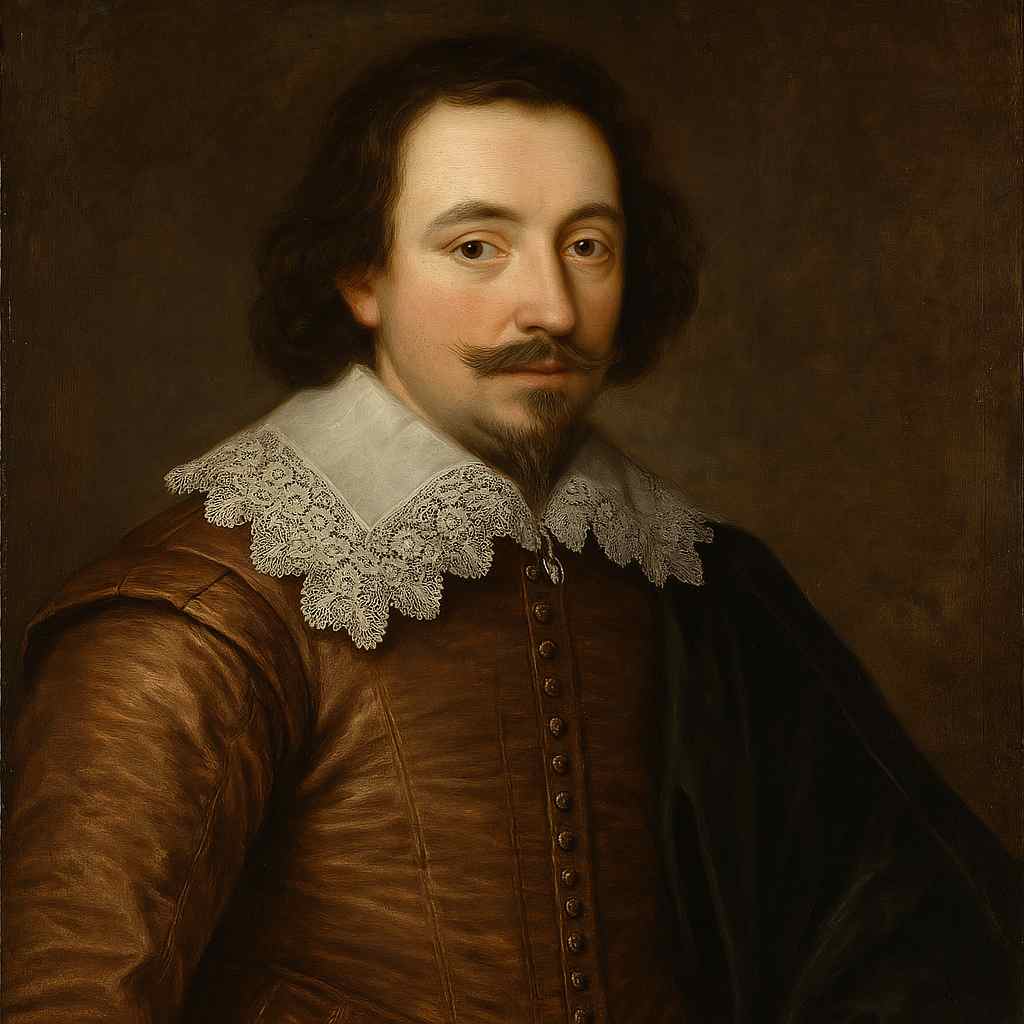1 Poems by William Browne, of Tavistock
1588 - c.1650
William Browne, of Tavistock Biography
William Browne, of Tavistock, stands as a somewhat enigmatic figure in the annals of English poetry, his life and work straddling the late Elizabethan and early Jacobean periods. Born in Tavistock, Devon, in 1588, Browne emerged from the pastoral landscapes of his native county to become a notable, if often overlooked, contributor to the rich tapestry of early 17th-century English literature.
Browne's formative years were spent in the rugged beauty of Devonshire, a landscape that would profoundly influence his poetic sensibilities. The rolling hills, verdant valleys, and meandering rivers of his homeland would later find vivid expression in his pastoral poetry, most notably in his magnum opus, "Britannia's Pastorals." This early connection to nature and place would remain a constant thread throughout his literary career, distinguishing him as a poet deeply rooted in the English countryside.
His education began at Exeter College, Oxford, where he matriculated in 1604. Though there is no record of him taking a degree, his time at Oxford undoubtedly shaped his intellectual development and exposed him to the classical learning that would inform his later work. It was during this period that Browne likely began to hone his poetic craft, absorbing the influences of both ancient and contemporary writers.
After leaving Oxford, Browne's path led him to London and the Inns of Court, a common trajectory for young men of his social standing. He entered the Inner Temple in 1611, ostensibly to study law, but like many of his literary contemporaries, he found the legal world less appealing than the vibrant literary scene of the capital. It was in this milieu that Browne began to make his mark as a poet, forging connections with other writers and finding his voice amid the literary currents of the day.
Browne's poetic debut came in 1613 with the publication of the first book of "Britannia's Pastorals." This ambitious work, which would eventually comprise three books (the third remaining in manuscript until the 19th century), established Browne as a significant voice in the pastoral tradition. Drawing on classical models such as Theocritus and Virgil, as well as more recent exemplars like Edmund Spenser, Browne crafted a sprawling allegorical narrative set against the backdrop of his beloved Devon.
"Britannia's Pastorals" is notable not only for its vivid depictions of the English countryside but also for its complex interweaving of personal, political, and philosophical themes. Through the adventures of his shepherds and shepherdesses, Browne explored contemporary issues, offered thinly veiled commentaries on court life, and celebrated the virtues of rural existence. The work's intricate structure, blending narrative, lyric, and descriptive passages, showcases Browne's technical skill and ambitious literary vision.
In 1614, Browne published "The Shepherd's Pipe," a collection of eclogues that further cemented his reputation in the pastoral genre. This work is particularly significant for its inclusion of elegies for his friend Thomas Manwood, demonstrating Browne's ability to infuse the pastoral form with deep personal emotion and reflection on mortality.
Despite his early success, Browne's poetic output began to wane in the latter part of the 1610s. The reasons for this decline remain a matter of speculation among literary historians. Some suggest that financial pressures or personal setbacks may have played a role, while others posit that Browne may have found court life less congenial to his poetic temperament than he had hoped.
In 1624, Browne returned to Exeter College as a tutor, a position he held until 1625. This brief sojourn in academia offers a tantalizing glimpse of what might have been an alternative path for the poet. However, the details of this period, like much of Browne's life, remain frustratingly obscure.
The last definitive date we have for Browne is 1638, when he oversaw the printing of Thomas Occleve's "La Male Regle" for the Roxburghe Club. After this point, the historical record falls largely silent on Browne's activities and whereabouts. Some scholars have suggested that he may have retired to his native Devon, perhaps finding solace in the landscapes that had so inspired his early work.
Browne's poetic legacy, while not as widely celebrated as some of his contemporaries, is nonetheless significant. His mastery of the pastoral form, his vivid evocations of the English countryside, and his skillful blending of classical and native traditions mark him as a poet worthy of serious study. Moreover, his influence can be traced in the work of later poets, particularly those who sought to celebrate the English rural landscape.
In recent years, there has been a renewed scholarly interest in Browne's work, with critics reassessing his contributions to English poetry and his place in the literary landscape of the early 17th century. This reevaluation has highlighted Browne's technical skill, his innovative approach to pastoral conventions, and his engagement with the political and social issues of his time.
William Browne, of Tavistock, emerges from the mists of literary history as a poet deeply connected to place, a master of pastoral form, and a figure who bridges the Elizabethan and Jacobean literary worlds. His life and work offer a fascinating window into the cultural and intellectual currents of early 17th-century England, inviting modern readers and scholars to explore the rich tapestry of a poetic career that, while perhaps not as celebrated as some, remains an integral part of the English literary tradition.
This text was generated by AI and is for reference only. Learn more
Username Information
No username is open
Everything is free to use, but donations are always appreciated.
Quick Links
© 2024-2025 R.I.Chalmers (V2Melody).

All music on this site by R.I.Chalmers (V2Melody) is licensed under a Creative Commons Attribution-NonCommercial 4.0 International License.
Attribution Requirement:
When using this music, you must give appropriate credit by including the following statement (or equivalent) wherever the music is used or credited:
"Music by R.I.Chalmers (V2Melody) – https://v2melody.com"
Support My Work:
If you enjoy this music and would like to support future creations, your thanks are always welcome but never required.
Thanks!


